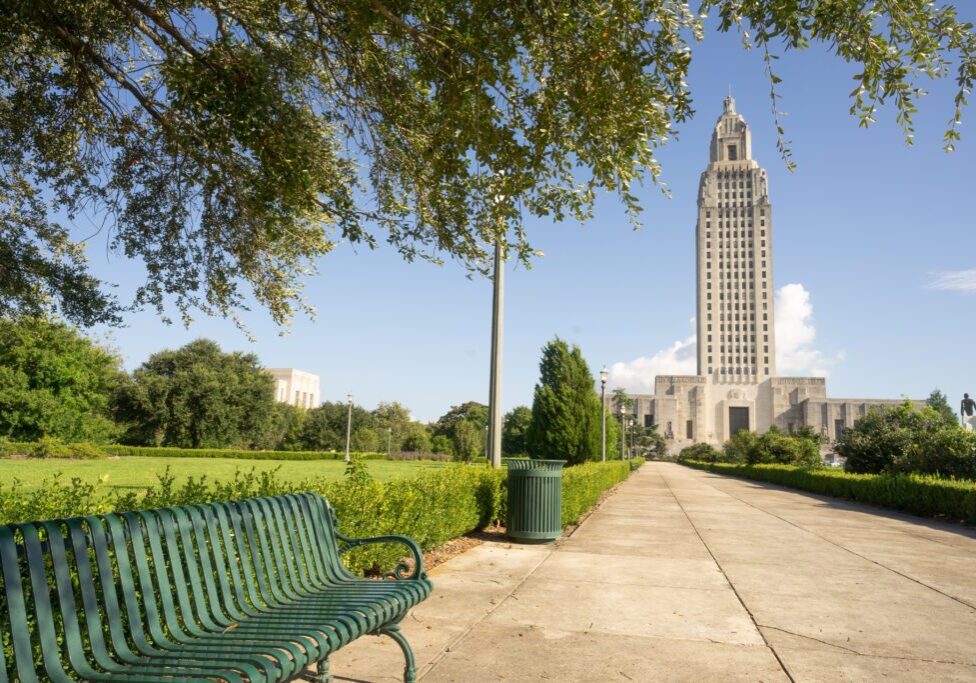For decades, Louisiana has routinely ranked at the bottom of the “good” lists and the top of “bad” lists on measures of poverty, crime, health and other indicators of well-being. With statewide elections around the corner, The Times-Picayune | Baton Rouge Advocate’s Tyler Bridges looks at how conditions in Louisiana have evolved over the past two administrations. The good news: There’s been great progress on literacy and health insurance coverage. But Louisiana remains saddled with an unacceptably high poverty rate, which in turn is driving high crime rates and poor health outcomes.
The state ranked 49th in poverty in 2020, the last year that statistics were available nationwide. Jan Moller sees a direct correlation between the state’s economic problems and its low health rankings. “All of those things are downstream from poverty and economic despair,” said Moller, director of the Louisiana Budget Project in Baton Rouge. “If you address poverty by lifting people’s wages and building a stronger floor underneath them, you will eventually turn the tide on all of those factors.”
A coronation for insurance commissioner
Louisiana’s property insurance market is in crisis, as coverage is scarce and premiums are spiking to unaffordable levels. Unfortunately, voters won’t get a robust public debate on how to solve this crisis, as Tim Temple automatically became the state’s next Insurance Commissioner last week when his only opponent dropped out of the race. As The Times-Picayune | Baton Rouge Advocate’s Stephanie Grace explains, Temple favors an industry-friendly “free market” approach to insurance regulation.
There’s a competing philosophy, of course, one that doesn’t rely on giving insurers what they want and hoping the market will take care of the rest. It argues for setting more rules for those who want to do business in the state, on the theory that government needs to advocate for the people it represents against businesses that are motivated by profit. It might even espouse a better public option than the one offered now, because, as with flood insurance, there are some risks that the private sector just doesn’t want to take on.
As an Advocate editorial notes, Temple wasn’t the only candidate to be elected by acclamation, who will now have to navigate the damaging effects of climate change. Agriculture Commissioner Mike Strain was elevated to a fifth term when no opponent signed up.
Just as the impact of massive hurricanes has unsettled the insurance markets, so have those storms hammered Louisiana’s major moneymakers off the land, farms and timberlands. And if flooding and winds are one threat, today’s super high temperatures remind us that drought can threaten Louisiana’s economy too. Ranchers are suffering from the “heat dome” of August. Beyond the fence lines of Louisiana farms, the pandemic’s shipping strains and now the Russian aggression in Ukraine have unsettled the worldwide market for both food and fiber.
Higher ed budget cuts
West Virginia University is facing a severe budget crisis stemming from declining enrollment and reduced state investment. A similar situation could play out over the next few years in Louisiana as declining birth rates drive down the number of college-age students and an expiring sales tax creates a massive hole in the state budget. The Louisiana Illuminator’s Piper Hutchinson examines how the Mountain State could provide a cautionary tale for what’s on the horizon here, and what our leaders should do to weather the coming crisis.
But a $400 million budget hole would likely mean significant cuts to higher education and health care. If Louisiana were to go off two cliffs at once — enrollment and fiscal — it could mean another disaster. “I am definitely worried about the double impact,” [Steven] Procopio (of the Public Affairs Research Council) said. That disaster could be mitigated by another increase in tuition and fees. But that also could mean Louisiana students, who come from homes with some of the lowest household incomes in the nation, opt to bypass college if the TOPS scholarship doesn’t cover enough of their costs.
From 2008 through 2015, Louisiana slashed higher education funding by 42% – about $4,941 per student. This was more than any other state in the country.
Taxing millionaires to feed students
Fewer Louisiana students will have to learn on empty stomachs because of Rep. Kyle Green’s Act 305, which provides free breakfast and lunch for all public school students who are in the reduced-price lunch program. But lawmakers in Massachusetts have gone a step further and are using a new tax on millionaires to provide free lunch to all students. NPR’s Ayana Archie reports:
Massachusetts’ new budget will provide free school lunches for K-12 students, thanks to an additional 4% income tax on state residents’ incomes above $1 million. The extra tax, known as the Fair Share Amendment, was approved by voters in November 2022. It is generating an extra $1 billion for the state. Of that, $224 million will go to K-12 programs, including free lunch and implementing “clean energy” in schools, the governor’s office said. “This FY24 budget shows that Massachusetts can address critical needs like housing, college affordability and hunger while also remaining fiscally responsible,” state Administration and Finance Secretary Matthew Gorzkowicz said.
Number of the Day
42 – Number of weeks of income it would take an average American to pay off a new car, compared to 33 weeks before the pandemic. Seasonalized rates of severe delinquency for auto loans are at the highest levels since at least 2006. (Wall Street Journal)
